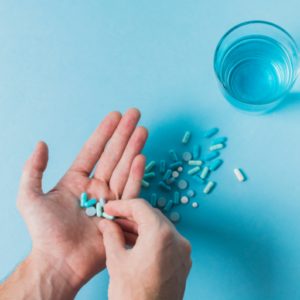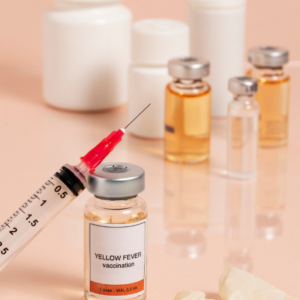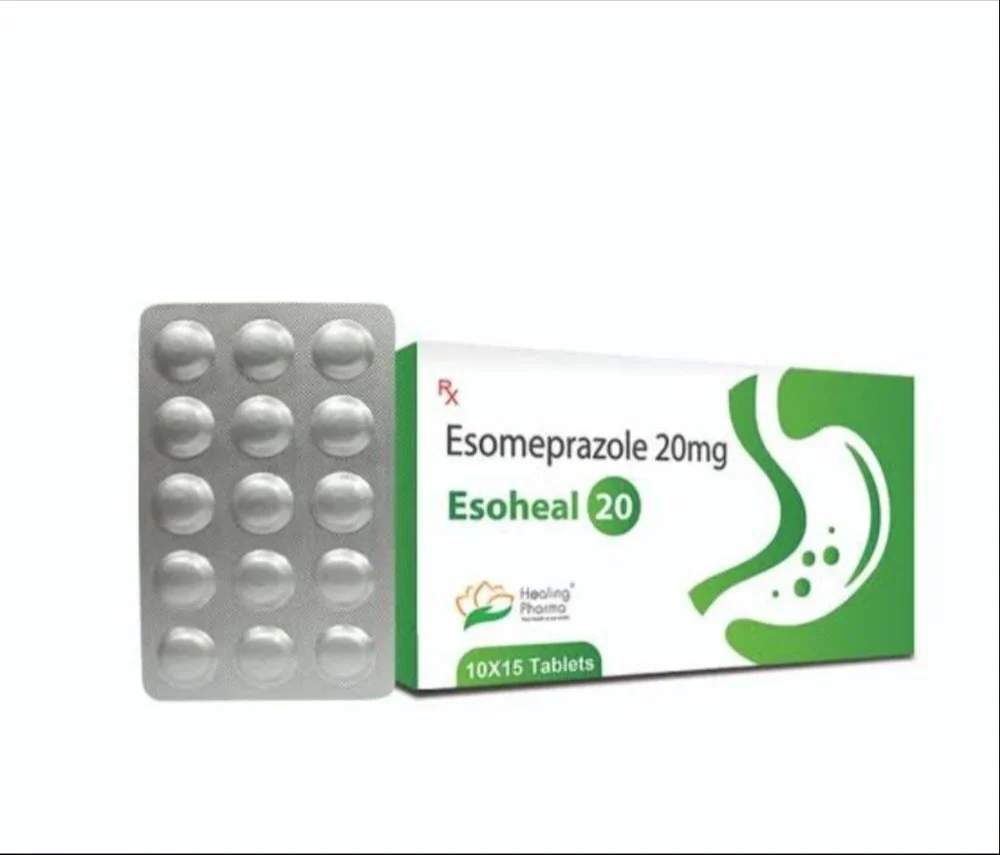Esoheal 20mg
| Package | Per tablet | Savings | Price |
|---|---|---|---|
| 180 tablets | $0.15 | $9 | $36 $27 |
| 150 tablets | $0.15 | $7 | $30 $23 |
| 120 tablets | $0.16 | $5 | $24 $19 |
| 90 tablets | $0.17 | $3 | $18 $15 |
| 60 tablets | $0.18 | $1 | $12 $11 |
| 30 tablets | $0.20 | – | $6 |
What is this medicine?
ESOHEAL 20 mg contains Esomeprazole, which is a proton pump inhibitor (PPI). This medicine is used to treat conditions where there is too much acid in the stomach, such as gastroesophageal reflux disease (GERD), stomach ulcers, and erosive esophagitis. It may also be used to help prevent stomach ulcers caused by NSAIDs or H. pylori infection, in combination with antibiotics.
What should I tell my health care provider before I take this medicine?
They need to know if you have any of these conditions:
-
liver disease
-
low magnesium levels
-
osteoporosis or history of fractures
-
lupus or other autoimmune conditions
-
problems with swallowing or persistent vomiting
-
blood in stool or vomit
-
severe diarrhea
-
an unusual or allergic reaction to esomeprazole, other PPIs, medicines, foods, dyes, or preservatives
-
pregnant or trying to get pregnant
-
breast-feeding
How should I use this medicine?
Take this medicine by mouth with a glass of water. It is usually taken once daily, at least 1 hour before a meal. Do not crush or chew the tablet—swallow it whole.
Take your doses at regular intervals. Do not take your medicine more often than directed. Do not stop taking this medicine without consulting your doctor, even if you feel better.
Overdosage: If you think you have taken too much of this medicine, contact a poison control center or emergency room right away.
What if I miss a dose?
If you miss a dose, take it as soon as you remember. If it is almost time for your next dose, skip the missed dose and take only your next dose. Do not take double or extra doses.
What may interact with this medicine?
-
atazanavir, nelfinavir (used for HIV)
-
clopidogrel
-
cilostazol
-
digoxin
-
diazepam
-
iron supplements
-
ketoconazole, itraconazole
-
methotrexate (especially at high doses)
-
phenytoin
-
rifampin
-
St. John’s Wort
-
warfarin
This list may not describe all possible interactions. Tell your health care provider about all the medicines, supplements, and herbs you use. Also mention if you smoke, drink alcohol, or use drugs.
What should I watch for while using this medicine?
-
Tell your doctor if your symptoms do not improve or worsen.
-
Long-term use (especially over a year) may increase the risk of bone fractures, low magnesium levels, and vitamin B12 deficiency.
-
Report symptoms like persistent diarrhea, muscle cramps, dizziness, or palpitations—these may be signs of low magnesium.
-
If you develop black or bloody stools, or vomit that looks like coffee grounds, contact your doctor immediately.
-
Avoid taking this medicine for longer than prescribed.
-
Inform your doctor if you develop new or unusual symptoms while using this medicine.
-
If using this medicine for H. pylori, take the full course with antibiotics, even if symptoms improve early.
What side effects may I notice from this medicine?
Side effects that you should report to your doctor or health care professional as soon as possible:
-
allergic reactions (rash, itching, swelling, dizziness, trouble breathing)
-
chest pain
-
severe stomach pain
-
persistent diarrhea
-
signs of low magnesium (e.g., muscle cramps, seizures, irregular heartbeat)
-
signs of liver problems (e.g., yellowing skin/eyes, dark urine)
Side effects that usually do not require medical attention (report if they continue or bother you):
-
headache
-
diarrhea or constipation
-
nausea
-
stomach pain
-
gas
-
dry mouth
-
drowsiness or dizziness
This list may not describe all possible side effects.
Where should I keep my medicine?
-
Keep out of the reach of children.
-
Store at room temperature between 20 to 25 degrees C (68 to 77 degrees F).
-
Protect from moisture and heat.
-
Do not use this medicine after the expiration date.
























